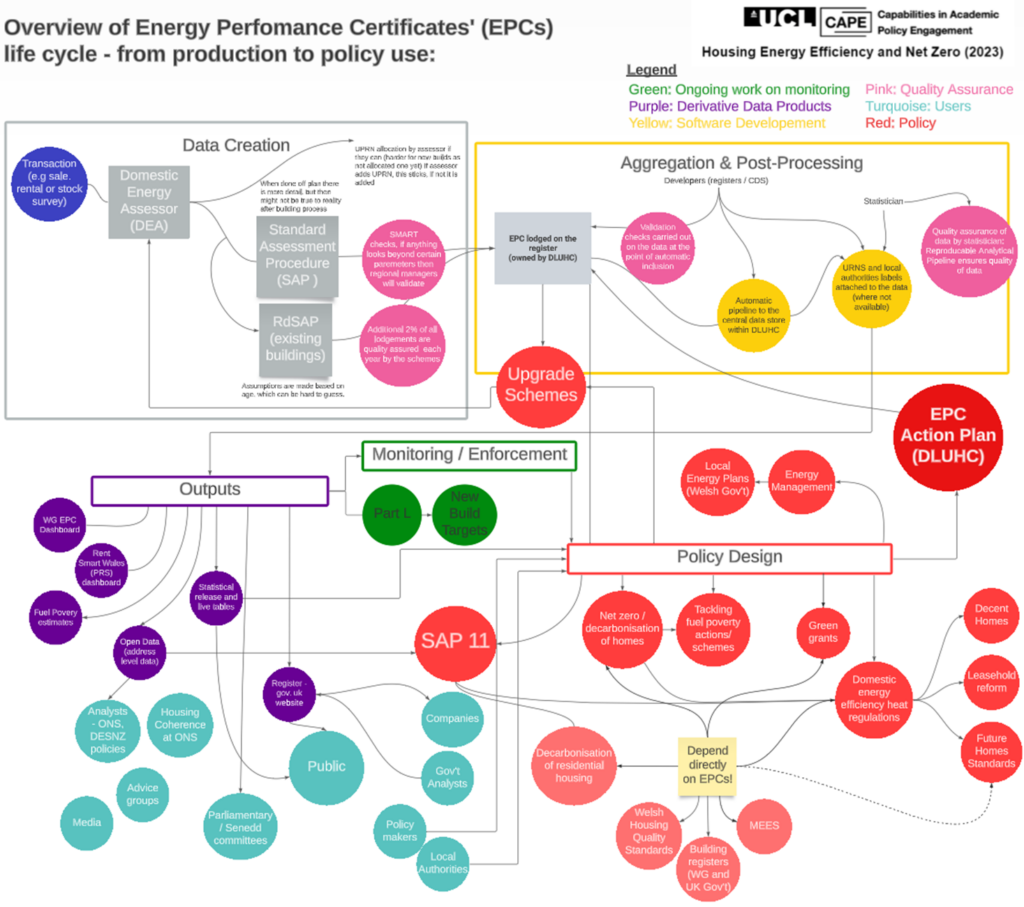Data challenges for achieving net zero across the UK
⌚ Estimated reading time: 10 minutes

Dr Bonnie Buyuklieva
CAPE Policy Fellow, Housing Energy Efficiency
Data is vital in enhancing energy efficiency policies, and comparability is essential for its effectiveness. Identifying the evidence required to support future policymaking at both the local scale and across the four UK nations highlights the importance of collaboration. By bridging data gaps, we can establish a solid foundation for energy efficiency and net-zero policies.. This briefing note is the outcome of a CAPE knowledge exchange project, conducted in collaboration with International Public Policy Observatory, the Department for Levelling Up, Housing and Communities, the Welsh Government and other partners.
Energy efficiency is a significant policy priority to mitigate climate change. Data plays a crucial role in identifying opportunities for improving energy efficiency and tracking progress towards net zero targets. The availability of comparable data holds considerable benefits for policymakers. It enables evidence-based decision-making and effective policy interventions. However, challenges persist in utilising and comparing data across the United Kingdom, hindering comprehensive analysis and coordinated efforts. Addressing these challenges is crucial for achieving sustainable energy efficiency goals.
This briefing note is an output of a CAPE (Capabilities in Academic-Policy Engagement) knowledge exchange project, in collaboration with DLUHC and IPPO, on comparative local and national data on housing energy efficiency and net zero across the four UK nations. The project has explored relevant national and local datasets and policies across the UK and co-identified evidence needs to support future policymaking.
Policy context
Key policies at different levels drive the UK’s sustainability agenda. These include: the Climate Change Act (2008); the Welsh Wellbeing of Future Generations Act (2015); the proposed Wellbeing and Sustainable Development (Scotland) Bill (2022); the forthcoming Northern Ireland multiyear energy efficiency programmes and the Net Zero Growth Plan (2023). With a diversity of approaches and priorities for data collection and curation at the national and sub-national level, there is great potential to share learning across the four nations of the UK and associated departments. This type of knowledge exchange between universities and relevant policy organisations is essential to delivering housing energy efficiency and net zero work.
Why data matters for energy efficiency
Data can help improve energy efficiency in buildings. Specifically, effective management of data is crucial for justifying and sustaining housing energy efficiency and net zero initiatives, along side other local schemes. For example, GeoPlace – a partnership between the Local Government Association and the Ordnance Survey – hosts a portfolio of case studies where UPRNs have been used to fund council projects, from improving housing conditions to delivering local broadband. One important step for increasing the use of data related to energy efficiency was made when the Department of Levelling Up, Housing and Communities (DLUHC) started to allocate UPRNs to EPCs and Display Energy Certificates (a certification for public buildings) as of November 2021 (Roberts, 2021).
What datasets are currently used across the UK?
- Energy Performance Certificates (EPCs) for residential properties – are designed to measure only one dimension of efficiency (heat loss). They are, however, the most commonly used and most comparable source of estimating housing energy efficiency across four nations.
- Residential housing conditions surveys – carried out at the national and sub-national levels – are the standard benchmarks for energy efficiency as they give the highest granularity of cross-verified information.
- Unique Property Reference Numbers (UPRNs) – identifiers for every address in Great Britain. As an enabler of comparative data on housing energy efficiency and stock condition, they have yet to be used to their full potential. The assignment of these identifiers is the responsibility of the data owners at the local level.

Challenges in data use
Comparable data offers policy benefits to benchmark energy efficiency milestones and targets for achieving net zero goals. However, there are currently some challenges in data use and comparability across the UK. Accessibility remains a key barrier: both in terms of information and data literacy. Data accessibility is about information literacy (‘getting hold of’) and data literacy (‘interpreting’). Both play a significant role in effectively engaging with data for policy use and monitoring success. Acknowledging the complexity of data sharing and embracing sustained collaborative approaches will help to navigate issues of comparability. These include the challenges of diverse data sources and contextual factors, and evolving technologies. Here are some suggested recommendations on both fronts:
Comparability
Data comparability – the ability to meaningfully compare and combine data from various sources, methods, or time periods – has multiple and multi-dimensional constraints. For example, diverse data sources can be measured, estimated or a combination of both. Therefore, having a shared way to communicate uncertainty would be important to reduce the complexity of sharing and comparing data. Well-documented repositories and standardised quality assessment frameworks can further enable better decision-making and policy development. In addition, sustained collaborative approaches – i.e. contact points and exchanges between stakeholders and users at different points in a dataset’s lifecycle – will also enable longitudinal data sharing and production. Furthermore, sharing can also rely on and be encouraged by different legislative and statutory duties governing energy efficiency across the four nations. The ONS’ Government Statistical Service (GSS) community has various programs to improve data consistency, from user engagement to data harmonisation. One recommendation for extending the ONS work would be to develop and test robust data pipelines that enable machine-readable categorisation of supplementary data. This can be done by bringing stakeholders across a dataset’s lifecycle on the same page regarding developer capacity and documentation needs.
Tools and Training
Data comparability will require more than just data transparency – it will require a process of iterative learning and improvement. It must also keep up with the times as data-creating and hosting tools evolve. Data creation tools are rapidly changing with increased monitoring via sensors (e.g. smart meters and thermal imaging), and computers continue to handle more complex and powerful models. This has implications for data privacy as well as its creation and maintenance. For example, domestic address information – necessary for understanding and targeting energy inefficiency in building stocks – can be sensitive because it can reveal individual personal data such as who lives where. Coupled with energy usage patterns, this could impinge on individual privacy by indicating when someone is home or not. In addition, evolving technologies, such as shifts from database ‘dumps’ to queries in real-time through Application Programming Interfaces (APIs), will require new and different digital capacities and approaches to data processing and anonymisation. Training programmes within the civil service, in particular, can help assign clear roles and responsibilities to relevant parties in order to improve UPRN accuracy and, thus, data comparability across different geographic scales. In addition, data ‘housekeeping’ frameworks can provide meaningful insights over time while upholding privacy and legal considerations. Future work for data producers should involve:
- Addressing key archival challenges, such as establishing reliable documentation
- Ensuring accuracy and comparability of data between EPCs and other data sources
- Preserving privacy while simultaneously bridging user silos and keeping data ‘useful’
Suggested Next Steps
Consistent data is essential for demonstrating project value and identifying best practices on the road to net zero. Below are four challenges for supporting housing energy efficiency and net zero projects with robust and reliable data:
- In the context of housing energy efficiency and net zero initiatives, how can we measure the reliability of documentation of (nationally varying) data definitions? Otherwise, stated, what data standards are missing?
- How can data categorisation and granularity be effectively benchmarked so that meaningful insights can be achieved and anonymity is maintained?
- What are the best techno-legal practices for bridging data silos and enabling efficient data transfer across the four nations of the UK?
- How should progress be monitored in a shifting data landscape? Who should be responsible for administering training programs needed to effectively enhance data collectors’ understanding of their role in maintaining data comparability (esp. UPRN accuracy) for housing energy efficiency and net zero projects?